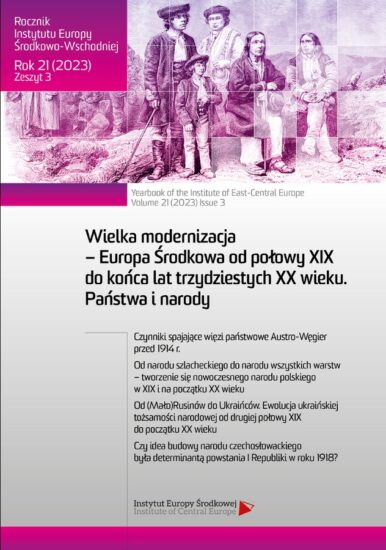Was the idea of creation of the Czechoslovak nation a determinant of the establishment of the First Republic in 1918?
ORCID: Piotr Majewski: 0000-0001-9672-2283
Strony: 175-192
Wydanie: Lublin 2023
DOI: https://doi.org/10.36874/RIESW.2023.3.9
Sposób cytowania: P. M. Majewski, Czy idea budowy narodu czechosłowackiego była determinantą powstania I Republiki w 1918 r.?, „Rocznik Instytutu Europy Środkowo-Wschodniej” Rok 21(2023), z. 3, s. 175-192, DOI: https://doi.org/10.36874/RIESW.2023.3.9
Słowa kluczowe: Czechosłowacja, czechosłowacki, I wojna światowa, polityka narodowościowa, stosunki narodowościowe
Abstrakt: : Before 1914, the idea of Czech-Slovak unity did not play an important role in Czech political life. This changed radically during World War I, and most Czech politicians began to postulate that an independent Czech state should also include the area of northern Hungary where Slovaks lived. This programme had primarily a geopolitical basis, but it was influenced by ideas of Czech-Slovak cultural and linguistic proximity that had already emerged in the 19th century. After Czechoslovakia's proclamation of independence on 28 October 1918, the unity of the two titular nations was recognised by the majority of Czechs elites and a certain part of Slovak elites as a kind of state ideology, which was conventionally called Czechoslovakism. This was reflected in the Czechoslovak Constitution of 29 February 1920 and other legal acts. At least until the autumn of 1918, however, a scenario in which the Slovak lands would not become part of the Czech state was also possible. This fact would certainly have had manifold consequences for the internal and international situation of such a state, but it did not rule out its normal functioning.
Bibliografia:

PDF: Pobierz